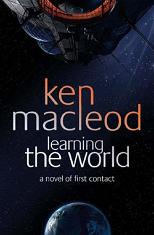
Learning the World
Ken MacLeod
398 pages
published in 2005
It only occurred to me after I finished this novel, that this was in fact Ken MacLeod's version of Vernor Vinge's A Deepness in the Sky. Like that, Learning the World is a novel of first contact between a planetbound alien civilisation and a human interstellar trading expedition. That realisation only dawned so late because despite the simular premise, the novels do not resemble each other all that much. MacLeod's version is much more straightforward than Vinge's book was.
Nevertheless, if you read these novels back to back MacLeod's novel does start to look like a cheap knockoff, especially in synopsis. Both have a species of planetbound aliens, operating at a more or less early twentieth century level of technology, divided into several nations in a political situation that resembles that of pre-World War I Europe. For both the arrival of the humans represent both an opportunity and a threat, with their presence accelerating the political tension already present. In both the humans are also divided amongst themselves about how to handle first contact.
But that's were the simularities end. The politics on display in Learning the World are quite different from those in A Deepness in the Sky, more believable, less dramatic, while the plot ends up in a quite different place. Also, MacLeod doesn't share Vinge's obsession with the Singularity, so his humans are much more technologically advanced while still recognisably human.
As are his aliens, as they're not very alien aliens. Some people may object to that, on the grounds that such humanlike aliens are a bit unlikely. For myself, I'm not bothered, as it's clear it never was MacLeod's intention to write a novel about truly alien aliens; there's only so much you can do with Solaris. By having humanlike aliens, MacLeod is able to concentrate on the suject he's interested in, the interaction between humans and the aliens. The aliens incidently, could be best described as alien space bats, which may mean that this book may just be the setup for a particularly obscure Usenet injoke.
Learning the World has two major storylines, one concentrating on the human expedition, the other on the alien space bats puzzling over the strange visitor to their solar system. The human storyline revolves around Atomic Discourse Gale, much of whose story is told in blog entries and Horrocks Mathematical. Both are young, born on the expedition's generation ship (which has the wonderful Banksian name But the Sky My Lady! But the Sky!), but where Atomic is of the ship generation, basically colonist stock, Horrocks is tenth generation ship crew, and feels smugly superior to her. Tne expedition they're on is a purely commercial venture, in a bizarre anarcho-capitalist way and the colonisation of the bat system is controlled by some sort of hyper active stockmarket. The conflict amongst the humans caused by the discovery of the bats therefore revolves for a large part around the understandable desire to just ignore them and get on with the serious business of asteroid futures speculation and the like.
Meanwhile, on Ground, as the aliens call their home, we meet Darvin, an astronomer at the University of Five Ravines in the enlightened nation of Seloh's Reach , who is the one who first discovers this strange anomaly in the nightsky that we know to be the human expedition. The Reach is in somewhat of a cold war with the sinister Realm of Gevork, a more militaristic and perhaps more scientifically advanced nation, which makes it all the more interesting that Darvin's greatest friend is a Devorkian, Orro, with whom he has a close scientific relationship.
With both humans and aliens gradually coming to realise the full impact of what they've stumbled upon, the stakes become higher and the tensions mount. On the humans' side there's concern about the danger of their arrival causing war on Ground, as well as revulsion at the way the bats treat a subspecies remarkably simular to themselves, but used and thought of as mindless slaves and beasts of burden. For the aliens, there's the question what the obviously technologically superior intruders want from them...
The resolution of all this comes in typical MacLeod style, not quite what you might be lead to expect, though also slightly too quick for me, as if he needed to finish the book now. As the title already gives away, all the protagonists learn to reinterpret the world, learn that it wasn't what they thought it were. Learning the World is a remarkably optimistic book, in that all these different ways of viewing the world, the universe, are shown to complement each other and to be able to coexist. No viewpoint is entirely correct, but neither are they completely wrong.
Read more about:
Ken MacLeod,
Learning the World,
science fiction,
book review